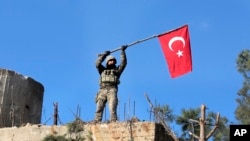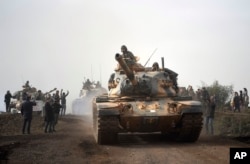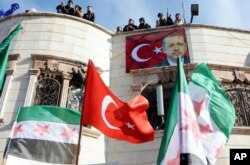Iran is the latest country to add its voice to growing calls for Turkey to curtail its military operation in Syria against a Syrian Kurdish militia. Turkey-Iran relations have recently improved, but Tehran is seen to be increasingly concerned about the lack of clarity on the scope and duration of the Turkish military operation and Ankara's goals.
"We wish for Turkey's operation in Syria to end at the earliest time," Iranian President Hassan Rouhani told reporters Tuesday.
Until now, Iran had remained largely silent about the Turkish offensive against the YPG militia. Turkish forces supported by Syrian rebels entered the YPG-controlled Syrian enclave of Afrin nearly four weeks ago. Ankara accuses the YPG of being terrorists linked to a Kurdish insurgency inside Turkey.
"They [Tehran] didn't think it was going to be that big an operation. Now it's very ambiguous, now it's seen as a threat," said Iranian expert Djamshid Assadi of the Burgundy School of Business in France. "The Iranians don't want a large Turkish military operation in Syria. They don't want to see any threat to their ally [Syrian President] Bashar al-Assad, and the Islamic regime of Iran does not want to see a neighbor as a competing force in Syria."
Rouhani's call for a swift end to the operation follows reports this week of a fatal clash between Turkish forces and Iranian-backed militias in Syria. Turkish Foreign Minister Mevlut Cavusoglu flew to Tehran on Wednesday to meet with his Iranian counterpart, Mohammad Javad Zarif. The meeting was ostensibly to discuss ongoing cooperation to resolve the civil war in Syria. In the last year, Moscow, Tehran and Ankara have been working together, in what has been dubbed the "Astana Process."
Turkish President Recep Tayyip Erdogan sought to play down tensions with Tehran over Syria, dismissing it as a Washington conspiracy. "You [the U.S.] may have plans regarding Turkey and Iran and maybe Russia, however, we will remain resolute," Erdogan said Tuesday at a meeting of his parliamentary deputies.
Alarm bells
The Turkish military operation in Syria poses a dilemma for Tehran. Analysts says Erdogan's commitment to prevent Washington's goal of creating a defense force made up of the Syrian Kurdish militia, along with his pledge to remove those forces from the strategically important Syrian town of Manbij, are probably welcomed by Tehran.
Since the start of the operation, however, Erdogan has continued to ramp up his rhetoric and with it an apparent broadening of its goals. On Tuesday, the Turkish president evoked memories of the country's past imperial glories when he said, "A sleeping giant is now awakened." He then pointed out how the Ottoman Empire once spanned 5 million square kilometers.
Such rhetoric is likely to set off alarm bells in Tehran.
"Turkey does not provide any calendar, any plan when Turkey will withdraw from the area," said international relations professor Huseyin Bagci of Ankara's Middle East Technical University. "The rhetoric of the Turkish president is creating a nostalgia for the Ottoman era. It indicates Turkey is trying to, probably to, re-control some of the Ottoman Empire, but the president plays with fire, domestically and internationally."
Adding to Tehran's concerns is the awareness that when Turkish forces intervene abroad, they seldom leave.
"The Iranians, of course, want the United States out of Syria," said a prominent Turkish columnist who wanted to remain anonymous, "but given the choice between the U.S. and Turkey in Syria, they [Tehran] know the U.S. will eventually leave the region, but the Turks never leave once they deploy soldiers."
Turkish forces still remain in Iraqi Kurdistan after being deployed in the 1990s to broker a peace agreement involving rival Kurdish factions, while Ankara refuses to withdraw from the Bashiqa military base in Iraq, despite repeated requests from Baghdad.
Political, diplomatic pressure
Analysts point out the chances of a military confrontation between Iran and Turkey remain remote, given the fact that, despite rivalries, both sides have for nearly four centuries, avoided conflict.
"There won't be a war between the two countries," said Iranian expert Assadi, "but Tehran can support Kurdish groups fighting in Turkey, and will use its proxy forces in Syria, as well as facilitate arming of Kurdish groups fighting Turkey."
Tehran is also looking to diplomacy. Rouhani announced Tuesday the possibility of meeting with the presidents of Turkey and Russia.
Erdogan has ruled out bowing to any political or diplomatic pressure to curtail the ongoing Syrian military operation. Such a robust stance is also seen as a strategic move by Ankara to enhance its voice in determining the final outcome of Syria, a prospect that likely will only add to Tehran's unease, and a concern analysts suggest finds rare consensus in the region.
"Turkey is trying to get stronger cards in its hand if the [Syrian peace] negotiators start," said international relations professor Bagci, "This is exactly why Iranians, French Americans, Israelis and Syrians don't want to see a strong Turkey there [in peace negotiations].There is a Turkish concern in the Middle East. Turkey is not considered a peacemaker but a peace breaker; this is Turkey's problem."







